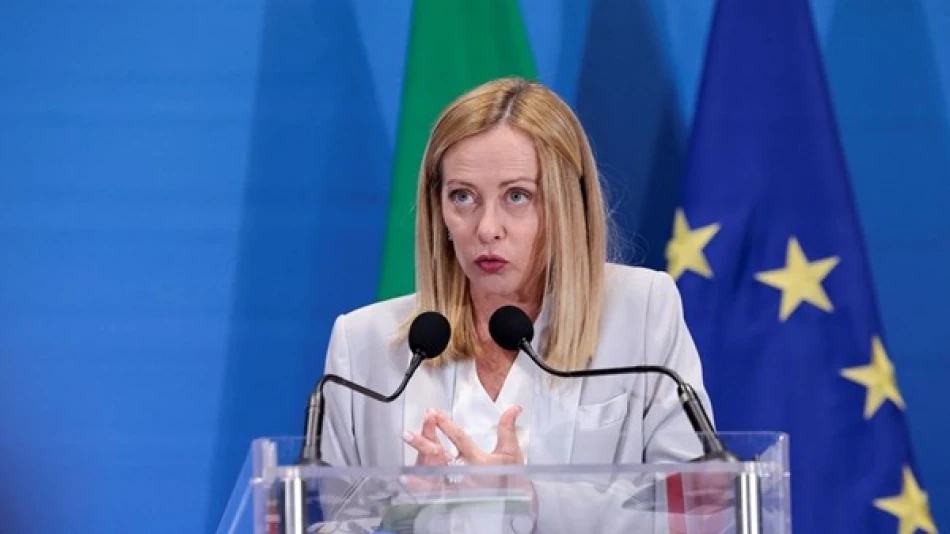
Italian PM Meloni Unveils Robust Ukraine Aid Plan
Europe Weighs "NATO-Lite" Security Framework for Ukraine with 24-Hour Response Commitment
European leaders are developing a new security architecture for Ukraine that would require allied nations to decide within 24 hours whether to provide military support in case of attack. The proposal, championed by Italian Prime Minister Giorgia Meloni, mirrors NATO's collective defense principles without granting Ukraine full alliance membership—a pragmatic compromise that reflects both geopolitical realities and Ukraine's urgent security needs.
The Italian Blueprint: Collective Defense Without Full Membership
Meloni's proposal represents a middle path between Ukraine's NATO aspirations and the alliance's reluctance to admit a country actively at war. The framework would establish a rapid consultation mechanism requiring signatory nations to coordinate swift responses to Ukrainian requests for assistance, including defensive support, economic aid, and military reinforcement.
Unlike NATO's Article 5, which treats an attack on one member as an attack on all, this "NATO-lite" approach stops short of automatic military intervention. Instead, it creates binding obligations for countries that have signed bilateral agreements with Ukraine to engage in immediate deliberations and provide coordinated support.
Strategic Timing and Trump's Endorsement
The initiative gains momentum following President Donald Trump's reported backing for Ukrainian security guarantees—a significant shift that European leaders are eager to capitalize on. This endorsement provides crucial political cover for a framework that might otherwise face skepticism from alliance members wary of deeper commitments.
Breaking the NATO Membership Deadlock
The proposal acknowledges what many European capitals have privately accepted: Ukraine's NATO membership remains off the table for the foreseeable future. Germany and other key allies have consistently opposed fast-tracking Ukrainian membership, citing concerns about escalation with Russia and the precedent of admitting nations in active conflict.
Market and Defense Industry Implications
This security framework could significantly impact European defense spending and industry dynamics. The 24-hour response requirement suggests a need for pre-positioned military assets and streamlined procurement processes, potentially benefiting defense contractors across the continent.
Financial markets may view this development as a stabilizing factor for Ukrainian bonds and European defense stocks, as it provides a more predictable security environment without the full risks associated with NATO membership.
Comparing Global Security Models
The proposal resembles other flexible security arrangements, such as the AUKUS partnership between Australia, the UK, and the US, or various bilateral defense agreements in the Indo-Pacific. However, the Ukrainian framework would be unique in its rapid-response timeline and collective consultation mechanism.
This approach also mirrors the incremental integration model used successfully with former Warsaw Pact countries in the 1990s, though under vastly different circumstances.
Challenges and Implementation Hurdles
The 24-hour decision timeline, while politically appealing, presents practical challenges. Different parliamentary systems across Europe have varying approval processes for military deployments, and emergency procedures would need harmonization to meet such rapid response requirements.
Additionally, the framework's effectiveness depends heavily on pre-agreed definitions of what constitutes an "attack" requiring collective response, and whether cyber warfare, economic coercion, or hybrid threats would trigger the mechanism.
The Broader European Security Calculus
This initiative reflects Europe's growing recognition that it must develop independent security capabilities beyond traditional NATO structures. The Ukrainian crisis has accelerated discussions about European strategic autonomy, and this framework could serve as a testing ground for future collective defense arrangements.
Success could pave the way for similar arrangements with other partners in Europe's neighborhood, potentially reshaping the continent's security architecture for the post-Cold War era.
Most Viewed News

 Layla Al Mansoori
Layla Al Mansoori






